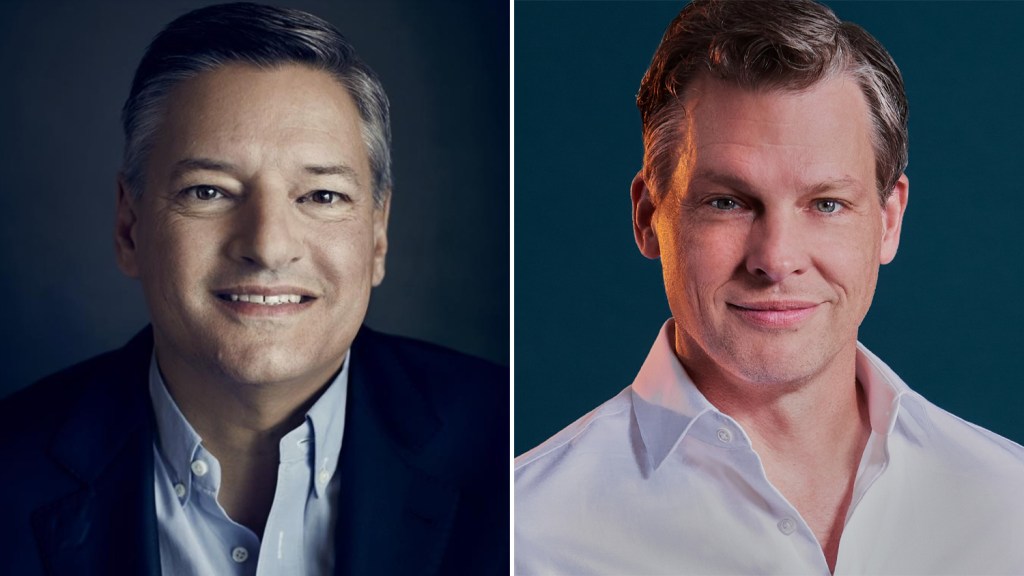
Netflix CEOs Ted Sarandos And Greg Peters Weigh In On Media M&A
Netflix co-CEO Greg Peters took another dig at big media M&A today as Warner Bros. Discovery formally put itself in play, calling studio mergers no sort of solution to the industry’s challenges. “You have to do that by the hard work of developing those capabilities in the trenches day to day. You don’t get there simply by buying another company that is also still developing those same capabilities,” he said on the giant streamer’s quarterly earnings webcast.
“Think about Disney Fox, and Amazon picking up MGM, Time Warner and AT&T and then Discovery and Warner. But you know, none of those mergers were a fundamental shift in the competitive landscape. And we have seen also a wide range of outcomes from such mergers. So watching some of our competitors potentially get bigger via M&A does not change in and of itself, at least our view, the competitive landscape, and we don’t think it changes the substance of the challenge that our competitors face — specifically the range of activities that we and our competitors have to get great at has never been assembled in a single company before.
“Think about producing film and TV shows across multiple genres and multiple languages in dozens of countries around the world. Trying to figure out how to incorporate the latest technology, including AI and Gen AI. We’re trying to figure out how we build better product experiences that can serve consumers better around the world. How about customer acquisition and retention? How do we optimize global payments? How do we optimize global partnerships? There is so much,” he said. He was doubling down on his comments at conference earlier this month when he rightfully disparaged the track record of big media mergers and said a Netflix bid for WBD was unlikely.
Warner Bros. Discovery earlier today that it’s received interest from multiple parties around a deal for all or part of the company — the specific part being Warner Bros. studio and streaming assets. The newly merged Paramount Skydance led by David Ellison, backed by deep-pocketed Oracle chairman Larry Ellison, wants it very much but WB rejected initial overtures as too low. There’s speculation around a possible play from other big, cash-rich tech companies or from NBCUniversal parent Comcast, a major media company with a strong balance sheet.
Could one or more lob an offer to drive up the price for Paramount? Comcast made a run at Fox in 2018 after the Murdochs already had one in hand from Disney, launching a bidding war. Comcast ultimately withdrew its offer and Disney prevailed, but at a price.
Ellison, backed by Oracle, has said without offering many details that his expanded company will lean heavily into tech. So another question is whether a Paramount-Warner combination could potentially see a different, more forward thinking trajectory than that traditional string of media mergers ticked off by Peters.
“It’s our responsibility to look at every significant opportunity. We’ve got a clear framework to evaluate those opportunities, and we’ll do whatever we think is best to do,” Peters said.
Co-CEO Ted Sarandos sounded slightly less heated. “We’ve been very clear in the past that we have no interest in owning legacy media networks, so there is no change there.”
He did not mention studios.
Warner Bros. is moving ahead with a separation of the company into Warner Bros. (streaming and studios) and Discovery Global (linear networks) as it explores its strategic options.
“When it comes to M&A opportunities, we look at them, and we look at all of them,” asking, “Is it a big opportunity? First question. Second, if it’s IP, does it strengthen our entertainment offering? Is there additional value in ownership? Does it strengthen our existing capabilities somehow? Does it accelerate our existing strategy? And you look at all these things relative to the price, relative to the opportunity cost, and relative to other alternatives.”
Asked if the streamer worried about losing access to third-party content, Sarandos said not really. “We’ve always seen these kind of ebbs and flows from third-party content in terms of access to it. Our competitors are also our suppliers, so they change their mind sometimes about selling to competitors. We’ve been dealing with that since the beginning of streaming. But, as we sit here today, we’re not dependent on any single supplier. No single supplier represents more than a small minority of our total view hours. And more importantly, I think, is that we’ve proven time and time again that licensing to Netflix is the best way to build audience, build revenue and create value for your IP, whether it’s Suits or Peaky Blinders or Breaking Bad. We’ve played a played a very positive role in the life cycle of other folks. IP.”
First Appeared on
Source link






